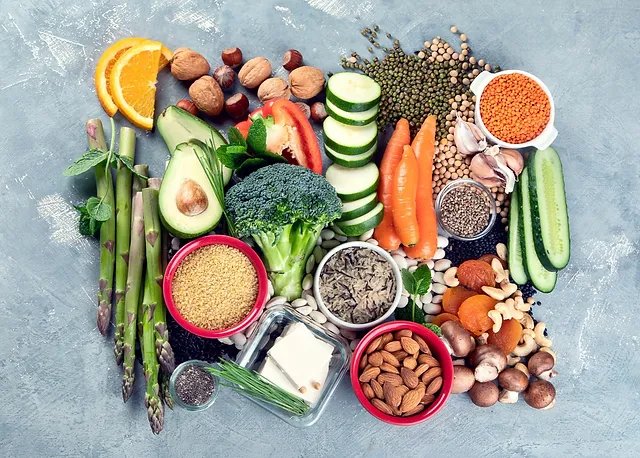A plant-based diet focuses on whole fruits, vegetables, legumes, nuts and seeds. It can also include moderate amounts of seafood and lean meats.
Eating plant-based can help reduce your risk of heart disease by lowering cholesterol and blood pressure levels. This is due to a reduced intake of saturated fat and fewer processed foods that promote plaque buildup in the arteries.
Heart Health Improvement
A plant-based diet is high in fiber, healthy fats and essential vitamins and minerals. It typically includes a variety of fruits, vegetables, whole grains, legumes and seeds but excludes meat, dairy and eggs. With a little research and planning, a plant-based diet can meet all of your nutrient requirements.
A study of twins found that those who switched to a whole food, plant-based diet experienced significant improvements in their cardiovascular health, including lower cholesterol levels and less plaque buildup in their arteries. Other studies have shown that a plant-based diet reduces the risk of heart disease in postmenopausal women and other adults.
To help make the transition easier, Manaker suggests starting small and aiming for one meatless meal per week. Then, gradually increase the frequency of your plant-based meals until you’re eating a meatless diet daily. When planning your meals, focus on consuming a wide variety of fruits and vegetables, whole grains and legumes (such as tofu, black beans, lentils), along with healthy fats from avocado and olive oil. Also, try to include foods that provide nutrients of focus (such as iron, calcium and vitamin B12) in each meal.
Weight Management and Loss
A plant-based diet can help you lose or maintain a healthy weight. It is also associated with lower rates of obesity and high blood pressure. Plant-based foods are naturally low in calories and high in fiber, making them filling and satisfying. They also tend to be lower in saturated fats and higher in heart-healthy unsaturated fats.
The main goal of a plant-based diet is to eat whole, plant-based foods. Adding vegetables, fruits, whole grains, nuts and seeds, beans and legumes, and heart-healthy oils can help you achieve this goal. The best way to stick with a plant-based diet is to meal plan and make sure you’re getting a variety of nutrient-rich foods each day.
A plant-based diet can be completely meatless or it can allow fish, eggs, dairy and other animal products, but limiting the frequency of those foods is key. Avoiding processed foods is another way to ensure you’re meeting dietary requirements. A well-planned plant-based diet should also include sources of iron, calcium, zinc, protein and vitamin B12. This can be achieved by pairing nutrient-rich foods together (like legumes and beans with oats and brown rice) or adding in fortified breakfast cereals and nutritional yeast.
Reduced Risk of Chronic Diseases
The nutrient-rich foods in a plant-based diet can help you lower your risk of certain chronic diseases. Studies have shown that a diet consisting of mostly plants can improve your chances of preventing or managing heart disease, type 2 diabetes, obesity and high blood pressure.
A plant-based diet does not exclude meat, but rather emphasizes a variety of vegetables and fruits, whole grains, beans, nuts, seeds and healthy fats like olive oil and avocado. Choosing these nutrient-rich foods will ensure you are getting the proper vitamins and minerals to keep your body functioning well.
Eating a plant-based diet can also strengthen your immune system. The phytochemicals and antioxidants found in plants work to reduce inflammation in your body caused by processed food, environmental toxins, bacteria and viruses. This can help prevent or treat conditions such as cancer, arthritis and inflammatory bowel disease. Interestingly, this same diet has been associated with improved mental health, possibly due to the lowering of cholesterol and other blood fats which can cause depression. A plant-based diet is also known to enhance mood through the release of serotonin.
Improved Blood Sugar Control
A plant-based diet focuses on whole foods that provide the foundation of your meals, including filling fiber and important nutrients. Colorful fruits and vegetables, whole grains, legumes, nuts and seeds make up the majority of a plant-based diet. These nutrient powerhouses deliver essential vitamins, minerals, antioxidants and phytochemicals for optimal health.
The low-calorie nature of these foods can also support weight management goals. Eating a plant-based diet can help you lose and maintain your healthy body weight by eliminating or cutting down on higher-calorie foods, including meat, dairy, processed foods and sugary drinks.
A well-planned plant-based eating pattern can easily meet your calorie and nutrient requirements, as long as you focus on consuming a wide variety of foods from whole, plant-based sources. Aim for a balance of protein (e.g. from beans, nuts and seeds), carbohydrates, fats and non-starchy vegetables at each meal. To ensure a balanced and nutritious diet, it’s important to consider your macronutrient ratios, meal timing and meal prep techniques. It’s also a good idea to get plenty of calcium and vitamin D from fortified plant-based milks, yogurts, cheeses and leafy greens.
Enhanced Digestive Health
A plant-based diet is rich in fiber, which normalizes bowel movements and reduces the risk of colon cancer. It also supports a healthy immune system and protects against inflammation, which is linked to some diseases, including heart disease and diabetes.
A plant-based eating pattern focuses on whole, plant-based foods like vegetables, fruits, whole grains (quinoa, farro, brown rice), beans and nuts/seeds. For most people, a well-planned plant-based diet can easily meet their nutrient needs.
Whether you are interested in improving your health, supporting animal rights or the environment, the plant-based diet can help you achieve all these goals. The key is making healthy changes that include adding more plants and avoiding processed foods.
Lowered Blood Pressure
A plant-based diet encourages the intake of whole foods, such as fruits, vegetables, legumes, whole grains and nuts, while limiting or eliminating animal products. It also incorporates healthy fats like avocados, olives and walnuts.
A growing number of research studies have found that a plant-based diet is associated with lower systolic and diastolic blood pressure. This can reduce the risk of heart disease, stroke and other cardiovascular problems. A plant-based diet can even decrease, or eliminate, the need for medication to treat high blood pressure.
Whether you’re concerned about the environment, animal welfare, or just want to feel more energized, a plant-based diet may be right for you. However, it’s important to plan out your meals and snacks carefully so that you can meet calorie and nutrient needs. If you’re new to the diet, it’s a good idea to start slow and gradually add one or two plant-based meals or days a week. This will help your body adapt to the change and prevent nutritional deficiencies. To learn more about plant-based eating, click here.
Increased Nutrient Intake
A plant-based diet is typically nutrient-dense, offering a wide variety of healthy vitamins, minerals and antioxidants. It’s also a highly sustainable eating style, especially with the right meal prep and planning.
Aim for whole fruits and vegetables (including dark leafy greens, tomatoes, berries, peppers, squash and carrots), whole grains (oatmeal, brown rice, quinoa), legumes (lentils, chickpeas, black beans), nuts and seeds and healthy fats like avocados. Avoid processed foods, which are often enriched with added sugars and sodium.
If you’re new to a plant-based diet, it can help to start slow, introducing one or two plant-based meals a week. This gives your body time to adjust and makes it easier to stick with the new eating plan long term. It may also be helpful to arm yourself with some dietary information, including recommendations for plant sources of protein and essential fatty acids, vitamin B12 and calcium. In addition, you can find a wide variety of fortified plant milks, spreads and cereals that can help meet these nutritional needs.
Conclusion
A plant-based diet is a great way to improve overall health and prevent chronic conditions like heart disease, diabetes, obesity and high blood pressure. It also boosts energy levels, improves digestion and helps maintain a healthy weight.
Those who choose to eat more plants can still include healthy, low-fat animal products such as fish, dairy, eggs and poultry. However, they should limit their intake of unhealthy animal products and avoid or greatly reduce processed foods as well as added fats and oils.
It’s important to talk to a registered dietitian before making this diet change. A diet designed by a qualified professional will ensure that you’re getting the nutrients your body needs, such as protein, iron and omega-3 fatty acids. In addition, a meal plan will help you stay on track and avoid deficiency symptoms, such as fatigue, depression or headaches. Finally, it will help you build a repertoire of recipes and techniques to make the shift easy and enjoyable.



